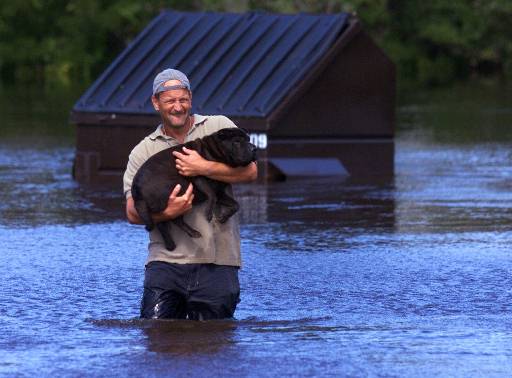Other Voices: Floyd’s lesson: Fear the flood
Published 6:54 pm Wednesday, September 12, 2018

- Tommy Sullivan carries his dog Isabella from a flooded parking lot near Leland on Sept. 16, 1999, after Hurricane Floyd hit the area. Bob Jordan/Associated Press
Since 1999’s Floyd, we’ve come to the conclusion that with hurricanes, water is the new wind.
Smarter construction methods — from beefed-up building codes to plain old common sense — seem to have helped mitigate damage solely from wind and, to a lesser extent, storm surge. We do, however, add these caveats: 1. Your roof might withstand strong winds, but that’s little comfort when a tree crashes through it; 2. North Carolina has not been hit by a Category 3 hurricane (111-129 mph winds) since 1996’s Fran.
Still, with Hurricane Florence bearing down on our region, Hurricanes Matthew (2016) and Floyd have taught us how devastating, deadly and widespread river flooding can be — regardless of a storm’s wind strength.
In fact, one of our region’s biggest concerns is not the speed of a storm’s winds, but the speed at which the storm itself is moving. A stalled or slow-moving system is terrible news. …
At this point, there’s not much folks can do to protect their homes from flooding. But people can protect their lives and the lives of loved ones by heeding flood warnings, especially concerning flash flooding.
Fast-moving and quickly rising water is unpredictable and unforgiving. That stretch of water across a highway might not look deep, but you don’t know what lurks beneath. Additionally, the danger associated with flash flooding is more about speed than depth. A foot or so of water surging across a road can sweep a car off the pavement and into a deep ditch or creek.
With Matthew and Floyd as our teachers, most people in Coastal North Carolina should be well-schooled on how to prepare for a hurricane and stay safe during and after. We’ve weathered plenty ourselves, and offer this general advice:
There’s no need to panic, but do closely monitor emergency information. As you are able, check on elderly, disabled or otherwise vulnerable family and neighbors. Stay out of the ocean until further notice; the rip currents are numerous and deadly. And most important, don’t flirt with disaster. Doing so can put your own life in danger, as well as the lives of those who would try to come to your rescue. It’s not worth it.
— StarNews of Wilmington

